Twenty-two Canberrans became Australian citizens this morning in an Australia Day ceremony at Rond Terrace by the shores of Lake Burley Griffin this morning. They came from the four corners of the world – from India, Indonesia, and the Philippines; from Poland, Norway, and the UK; from South Africa and Colombia.
Some had come to Australia for the promise of a better life; others were attracted by its freedom, its multiculturalism, and its kind and friendly people; others had fallen in love with the beauty of its landscape or for the outdoor sporting life. They were among 12,000 people from more than 130 nations who became citizens today.
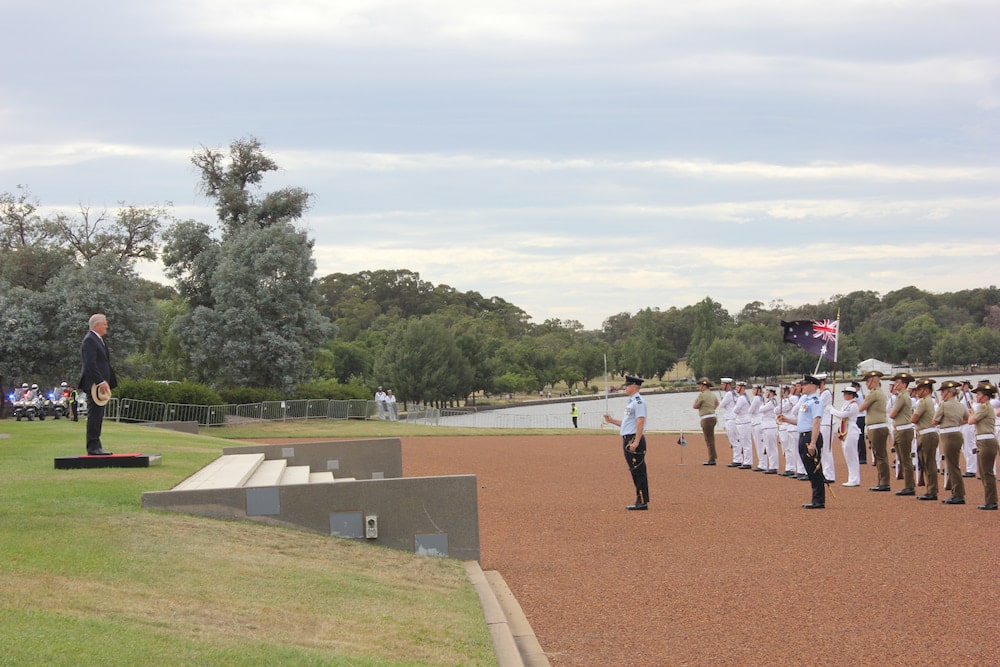
Prime Minister Scott Morrison presented the new Australians with their citizenship certificates. Australia, Mr Morrison said, was “the most successful and cohesive immigration and multicultural nation on Earth; the home of the world’s oldest living human culture; a modern prosperous and generous nation fair-minded hard-working; a standard-bearer for liberal democracy in a world where authoritarianism is once again seeking to push itself forward; an honest nation that continues to confront the truth of their past and to reconcile this with our future.”
The citizenship ceremony was the culmination of a ceremony which began with the band of the RMC Duntroon and Australia’s Federation Guard playing Waltzing Matilda. Governor-General David Hurley inspected the troops; and Ngunnawal elder Warren Daley welcomed all present to country. Cannons fired a salvo, while a helicopter flew overhead carrying an enormous Australian flag. Opposition leader Anthony Albanese was also present.
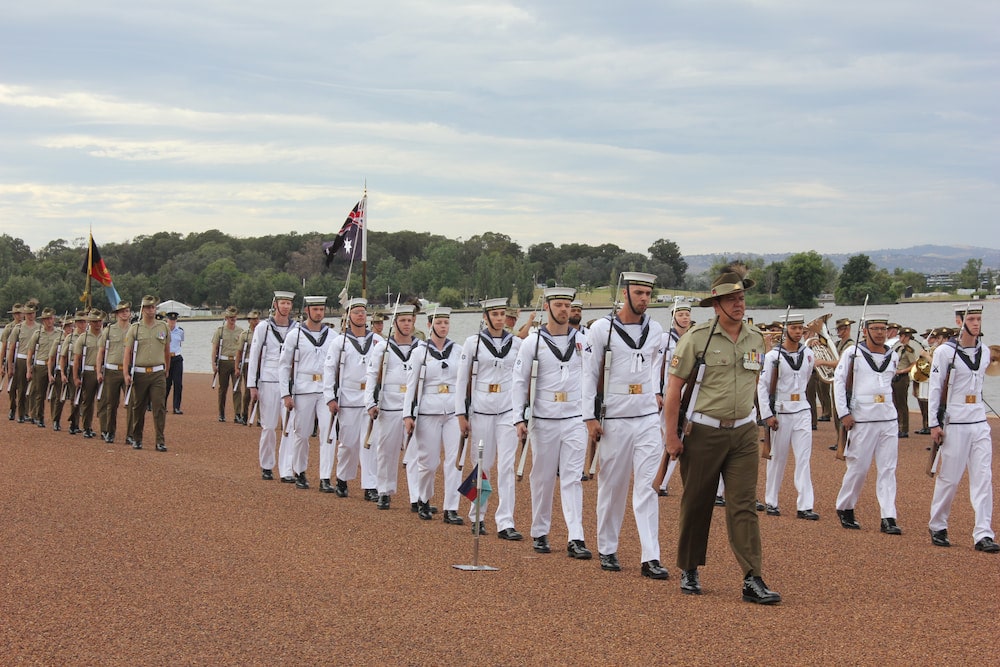
Danielle Roach OAM, chair of the National Australia Day Council, reflected on the hardships Australia had faced over the last year. Australians came together with compassion, empathy and courage, and responded as one, she said.
“Our nation is made of many people from hundreds of countries,” Ms Roach said. “We speak many languages and follow many faiths. To be Australian is to accept and commit to the values we share: fairness, equality of opportunity, mutual respect, tolerance, compassion, and the rule of law. We also call this the ‘fair go’. It is because of the values we share that today we celebrate our nation’s place in the world – a proud, ancient, multicultural nation that enjoys freedoms and opportunities other nations only aspire to.”
But for Australia’s Indigenous people, today was not a time to celebrate; they commemorate 26 January as Invasion Day and Survival Day. Indigenous people believe their lands were stolen, Diyan Coe, caretaker of the Aboriginal Tent Embassy, said; European arrival marked the beginning of tyranny, suppression and oppression.
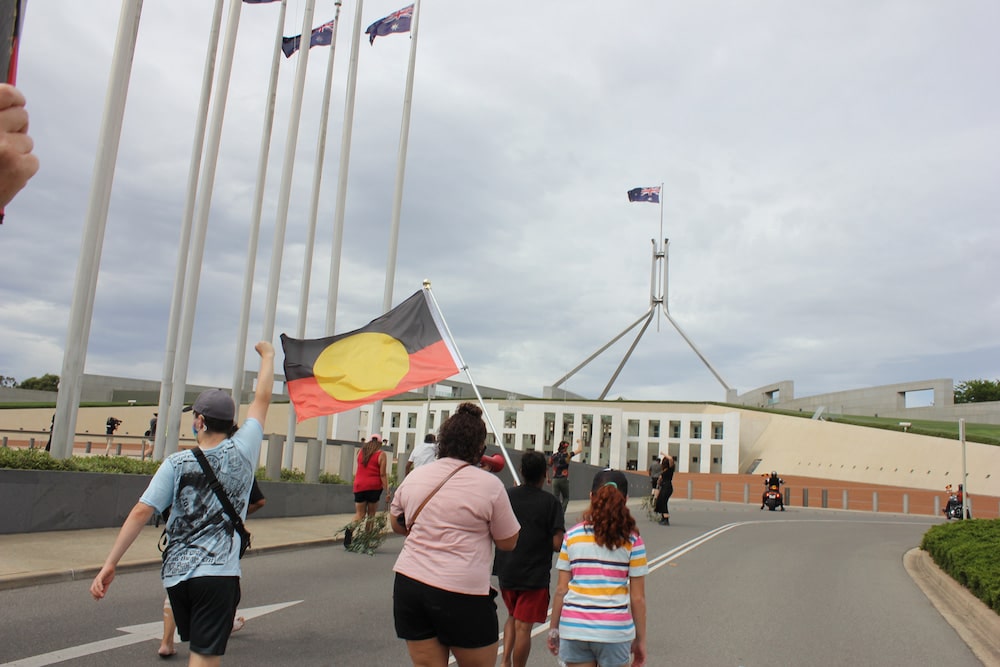
“On a day like this, just remember there are people mourning; we’re mourning the loss of our culture, our language, our practices,” Ngunnawal woman Justine Brown said.
Ms Coe and Ms Brown were among almost a thousand people – Indigenous and non-Indigenous – who marched from the Aboriginal Tent Embassy to Parliament House to protest against social inequalities and injustices. “Always was, always will be Aboriginal land!” they chanted. “No pride in genocide!” Similar events took place across Australia.
“The significance of the march is to show our white government or our government that we are still here; we’re still strong; we’re still united; and we’re still going to stand up for what is right and what is just,” Ms Brown said.
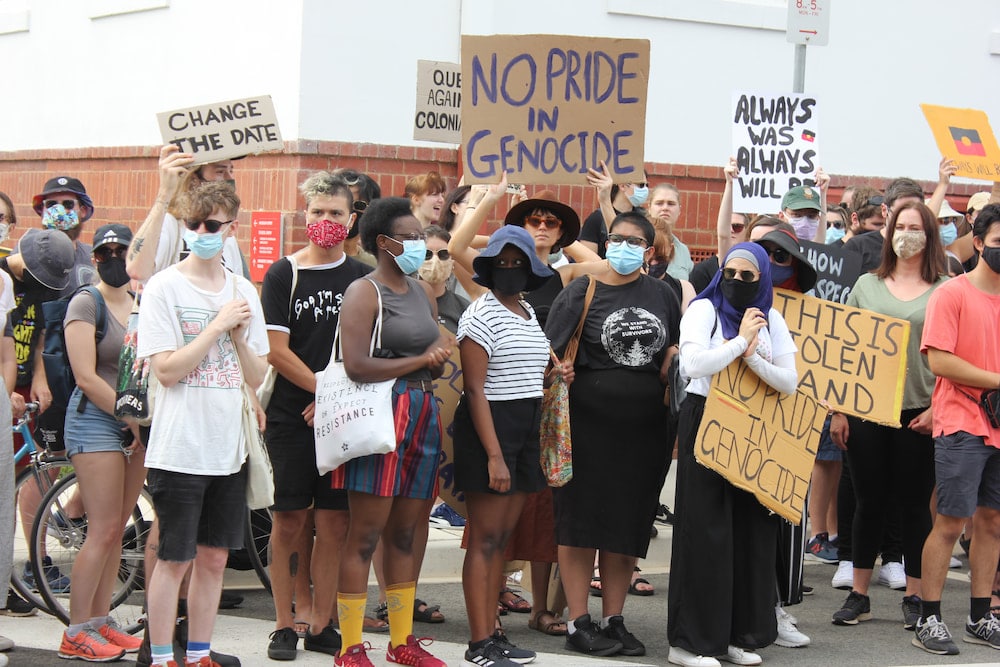
Ms Coe said that today’s protest march was about sovereignty and the need for land rights; about coming together to heal and listen to each other.
More than 400 Aboriginal and Torres Strait Islander people have died in custody since 1991, 11 in the last two years, while Indigenous children are still taken from their families a dozen years after the government apologised for the Stolen Generations. Some Aboriginal mothers fear their children will be taken from them moments after childbirth, protesters said.
In his speech at Rond Terrace, the Prime Minister had acknowledged the effect colonisation had on Indigenous Australians.
“On this day, the course of this land changed forever,” Mr Morrison said. “There is no escaping or cancelling that fact; for better or worse – and worse – it was the moment where the journey to our modern Australia began.” He spoke of “our First Nations peoples’ strong, ancient and proud culture, and their survival in the face of dispossession and colonisation.”
But Mr Morrison also urged that the day was one of unity for all Australians, whether Indigenous, British descendants, or more recent immigrants. “These stories don’t compete with each other. They simply coexist; they weave together to create Australia.”
No doubt Mr Morrison implicitly had calls to change the date of Australia Day in mind – a suggestion he resists. Many believe 26 January is inappropriate and divisive; the date commemorates the arrival of the British in Australia, and the raising of the Union Jack by Captain Arthur Phillip in 1788. They suggest another date such as Wattle Day in September, pointing to the fact that today’s nationwide holiday is only of recent origin, first held in 1994.
Ms Brown said non-Aboriginal people were welcome to mark 26 January in any way they liked, but advised that they ask Aboriginal and Torres Strait Islander how to make the event more appropriate and culturally sensitive. “We’re not saying you can’t celebrate being Australian. We’re just saying acknowledge what has happened.”
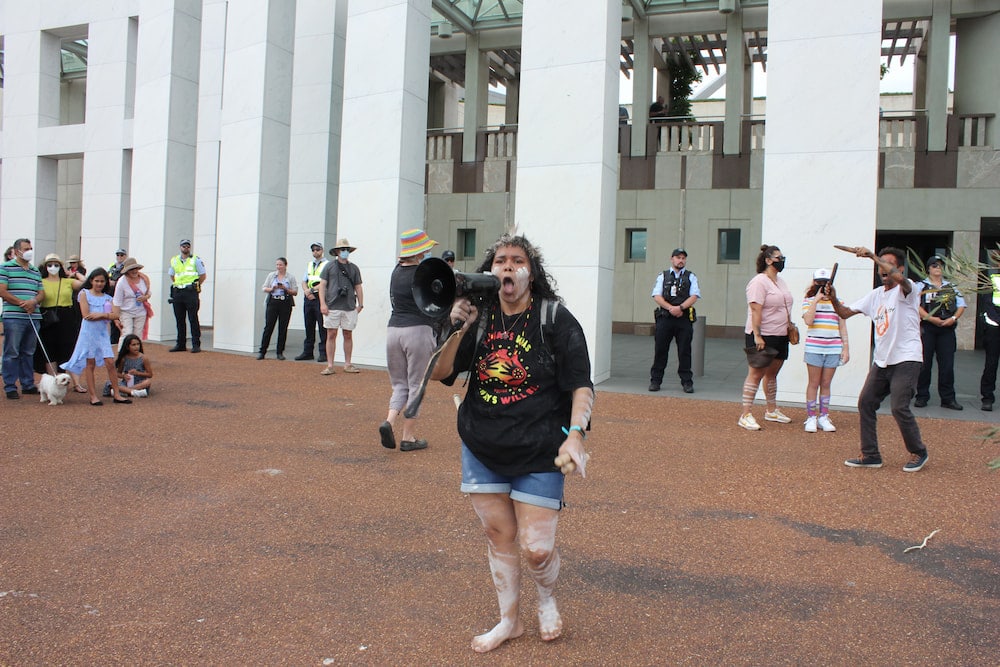
Some spoke of the need to educate non-Indigenous Australia, to live in a society where Indigenous people were treated fairly and with respect, were not victimised, but where white people understood the suffering colonisation had brought.
Many Indigenous people believe that reconciliation and restitution can come from working with the system. The Uluru Statement from the Heart (2017) calls for a ‘First Nations Voice’ within the Australian Constitution, giving Aboriginal and Torres Strait Islanders a say in law and policy that affects them. Others believe a treaty between the Commonwealth and Indigenous Australians will advance reconciliation; Australia is the only Commonwealth country without such a treaty with its Aboriginal population.
Ms Brown agrees that a treaty is needed, and she wants to see more Indigenous politicians, “people to actually represent us, and be our mouthpiece” – people like Victorian Greens Senator and Aboriginal activist Lidia Thorpe. “She’s putting her voice and our voice in those walls [of Parliament House], and it’s amazing. She’s making waves. We need more people like Lidia to do that.”
Others took a more extreme view. There were calls for civil disobedience, to tear down Parliament House, and for Scott Morrison and his government to step down. Many protesters feel the government is more interested in profit than in Indigenous people’s wellbeing.
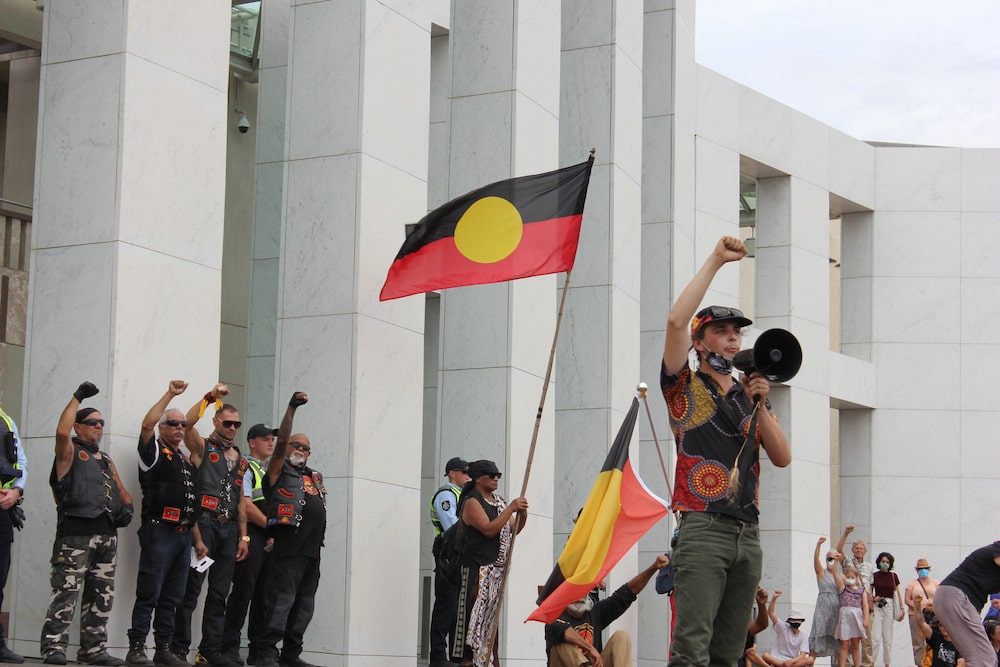
“When are you going to change and let us take control of our country?” Ms Coe asked. “We want Aboriginal people in up there [Parliament House] telling and saying what’s right and what’s wrong with this land, because we are the law of this land. … Aboriginal lore here precedes any law; it precedes international laws, and it also precedes any Commonwealth laws. … This land was stolen. … We want our sovereign right back. We want our lands back.”
It was not only Indigenous people who marched and protested. There were many from British and immigrant descent, including members of the ACT Greens.
“To see so many people of different nationalities come here today proves to us that we Aboriginal and Torres Strait Islander people aren’t alone in this fight,” Ms Brown said.
She wants to see “unity between multicultural people, between my Aboriginal and Torres Strait Islanders and the non-Indigenous people” throughout Australia – not just today, or on Harmony Day, but every day of the year.
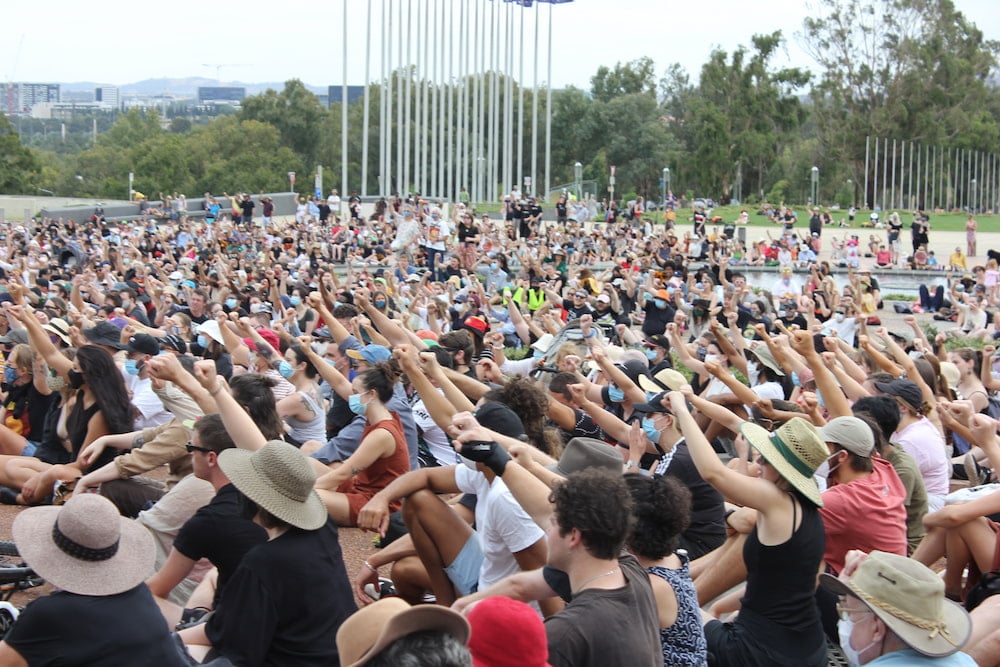
“[Non-Indigenous people] need to stop being scared. They need to come and have those conversations with us. You know, we’re not going to go crazy. We want to have those tactical conversations. We want to have both learning and teaching conversations.”
Ms Coe agreed. “Look at the supporters,” she said. “You see non-Indigenous people talking, and we let them talk, and once you open their eyes to what’s going on, a lot of changes will come. After every conversation you’re having with somebody, you go away with a different learning. A conversation with somebody is a part of healing.
“We don’t hate; we want to educate. We understand it’s not you that have done things, but whenever you sit back and not do anything, you’re part of that system up there [at Parliament House].”
The ACT Greens have marked today as a Day of Mourning, and believe Canberra should change how it marks 26 January. Perhaps flags should be lowered to half-mast, or a dawn service should acknowledge the “deep hurt” Indigenous people felt.
“This day means different things to many people, but ultimately today is a day of dispossession, rather than one of unity and celebration. It is an important day to take a moment to pause and recognise the true history of our country,” ACT Greens leader Shane Rattenbury said.
For more stories:



